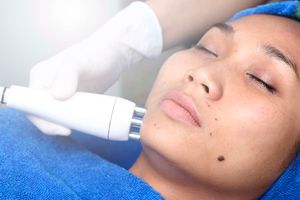Knowing your skin type is the key to having the right skincare routine

Signs of sensitive skin include redness, dry patches, itchiness, or tightness.
What you need to know:
- If you are looking for products that are best suited for your specific needs, consult a dermatologist or skincare expert, who will recommend a good routine.
Take care of yourself by drinking lots of water and eating nutritiously to improve your skin health as well as physical well-being.
Many people do not know how to take care of their skin because they do not know their skin type.
Skincare routines range from simple to complex, and determined by their age, skin needs, and lifestyle. A good skincare routine will moisturise the skin while balancing oil production and removing dead cells.
Knowing your skin type will help you customise your skincare routine for optimal results, and avoid common mistakes that could lead to dryness or clogged pores.
Types of skin
Oily skin
Oily skin is often shiny, prone to blackheads or pimples especially on the nose, chin, forehead, and cheek.
Skincare routine for oily skin: Cleanse twice daily with a gentle cleanser, remove oil using facial sponges or cloths. Exfoliate once weekly to unclog pores and prevent blackheads. Use facial masks for oily skin.
Combination skin
It has a combination of both oily and dry areas. The T zone (forehead, nose, and chin) is often the oiliest but can occasionally experience dryness.
Skincare routine for combination skin: Use a mild cleanser that will not over strip or irritate your skin. Use products that have oil balancing properties, avoid those that contain alcohol which can irritate and dry the skin, especially the T zone area where you might be oilier than usual.
Sensitive Skin
This type is easily irritated or itchy due to allergies or environmental factors such as wind, chilly weather, soaps/detergents, etc.
Signs of sensitive skin include redness, dry patches, itchiness, or tightness.
Skincare routine for sensitive skin: Cleansers should be gentle and non-irritating with no added fragrances that cause allergic reactions. Look out for natural ingredients like Aloe Vera that are soothing to the skin during the cleansing process.
Use an alcohol-free toner to remove any remaining impurities, and do not forget to apply a lightweight moisturizer after this process. Finally, consider applying sunscreen to protect your skin from harmful UV rays.
Dry skin
It lacks sebum, therefore, has many dry patches. Signs of dry skin include flaking, tightness, and itchiness. Causes of dry skin include excessive use of hot water, harsh cleansers, and exposure to cold weather. Dry skin can also be genetic and is more common in people with skin conditions.
Skincare routine for dry skin: Avoid using hot water during the cleansing process as it can strip away necessary moisture from your face. Use products that contain natural oils to hydrate your skin after washing. Also, consider applying a moisturiser before your makeup.
Normal skin
It has a balanced production of sebum and has no significant problems. It is neither overly oily nor excessively dry. Signs include a balanced skin tone and softness.
Skincare routine for normal skin: Use a cleanser and toner that will not dry out your skin and if possible, avoid using harsh scrubs or exfoliating products that may irritate the surface. Use face masks and facial oils to help nourish your skin after the cleansing process.
Using a toner will remove any impurities left on the face before applying moisturiser. Apply sunscreen before going out to protect your face from harmful UV rays.
In addition, consider the following when choosing a skincare routine for your type of skin:
- Avoid hot water and harsh chemicals on sensitive or dry skin as they can lead to irritation and redness.
- Always remove makeup before going to bed, no matter how tired you are.
- Drink lots of water and eat a healthy diet. This will improve your skin's overall appearance.
- Do not forget to use sunscreen during the day to protect against sun damage and reduce the chances of early signs of aging such as wrinkles, age spots, and fine lines.
- Avoid squeezing pimples or popping them. This can lead to infections, scarring and leave your skin susceptible to more acne in this area.
- Make sure you visit a dermatologist for possible skin problems such as blemishes or dark spots that can affect self-esteem and confidence levels.




